Julian Eaves reviews Preludes by Dave Malloy now playing at Southwark Playhouse.
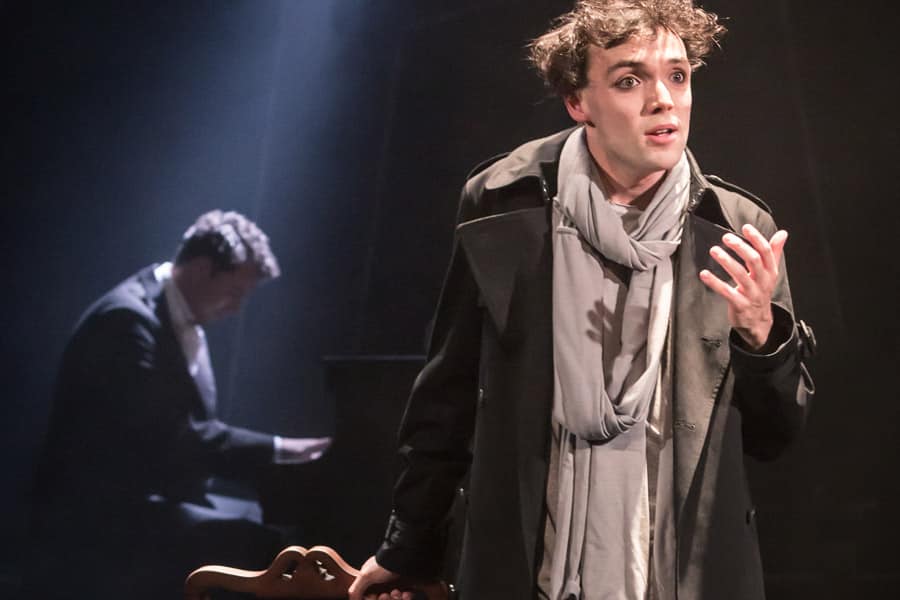
Preludes
Southwark Playhouse
11th September 2019
5 Stars
BOOK TICKETS
Following the disastrously botched premiere of his first symphony, the Russian composer Sergei Rachmaninoff famously experienced three years of writer’s block; his ultimate way out of this was a course of hypnotism and psychotherapy provided by the extraordinary Dr Dahl. After several months of daily sessions, he was freed from paralysing self-doubt and fear of failure, enabling him to blaze back into life – and eternal fame – as the creator of his second piano concerto, probably his most popular work. It also became the soundtrack to the film ‘Brief Encounter’ and umpteen other love affairs ever since. This is a wonderful tale of art and therapy overcoming emotional adversity. However, if you go into it expecting a kind of ‘On A Clear Day You Can See Forever’ mixed with vodka and sables, then, like those who go into the woods today, you’re in for a big surprise.
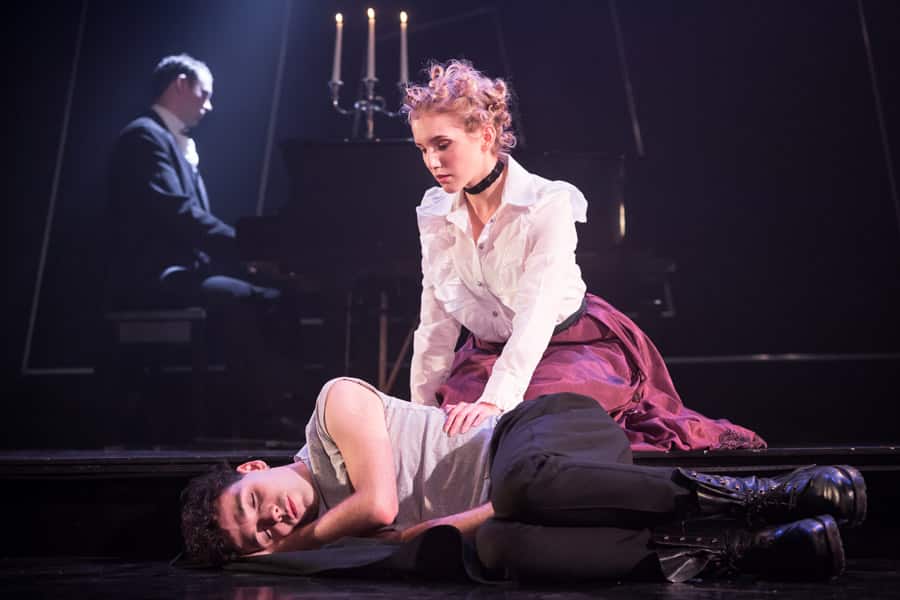
Dave Malloy, the remarkable and quite incomparable American maker of new musical theatre (‘Natasha, Pierre and the Great Comet of 1812’, ‘Ghost Quartet’ and other shows of his have been winning awards – including Obies and Tony nominations – since 2007) has turned his attention to this story very much in the manner of an auteur. He writes the book, lyrics, music and orchestrations, directing the experiences of his subjects through the transformative prism of his own life and times, and creates something utterly new and different. In this UK premiere production at the ever-enterprising Southwark Playhouse, in Alex Sutton, he has found a director with the intelligence, theatrical flair, and – above all – the personal commitment to realise his vision. Danielle Tarento is producing, and the creative team and cast assembled for this ground-breaking event are the very best.
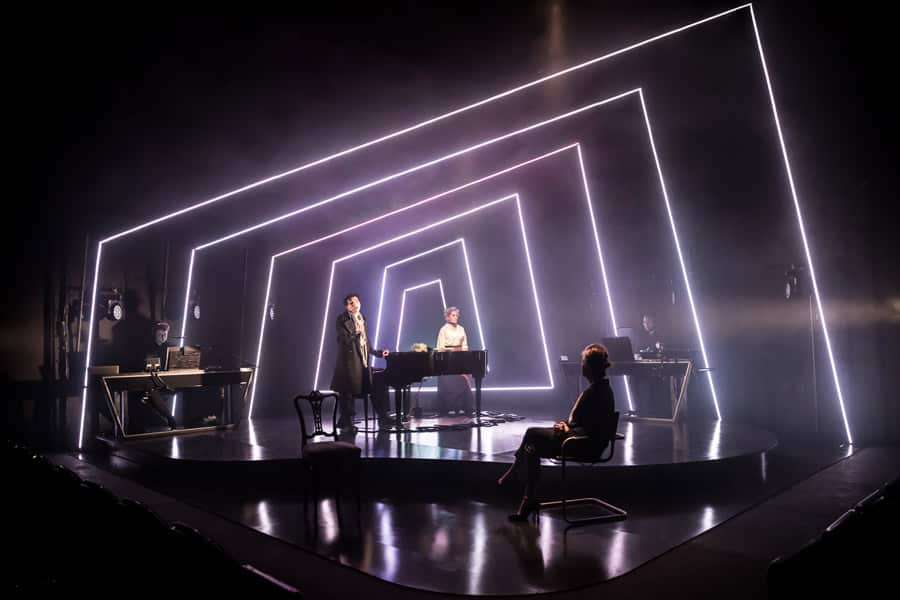
First off, there is an essay in the programme in which Sutton reveals his attitude towards the project and to theatre in general: ‘What is it for? What is its point? Is it just for entertainment? Is it for recognition? Is it for glory? Is it for fame? Is it for acceptance?’ Many more questions follow. Then we get to the direction he has found for this production: ‘Instead of a traditional musical that screams, “LOOK AT ME!”, or a play that says, “Think about me”, this show says, “Slow down, listen, remain calm, think, create, make, accept who you are and eventually you can navigate this world.”‘ With these thoughts in mind, you are ready to enter the large space to encounter a presentation the like of which you have probably never heard or seen before.
Rebecca Brower’s set (with tiered seating on two sides of the square) is a shallow black platform housing a black grand piano; it is flanked by two sound-mixing desks (for black-clad MD Jordan Li-Smith and his assistant Billy Bullivant) and framed by pencil-thin concentric rhomboids of light that intermittently flash and flicker and glow with white and blue and red against the surrounding darkness (design, Christopher Nairne). Opposite this, at the apex of the auditorium, designer Andrew Johnson manages the sound. From the very first ‘boom’ of deep electronic vibration that beats through our ears, combined with a perfectly synchronised ripple through the ribs of light on the stage, we are held together by this technological artistry. Malloy is a master of Electronic Dance Music and uses it, and many other influences – including some I think recognised from writers like Dallapiccola – to transmogrify the music of late romantic Rachmaninoff into sounds of today.
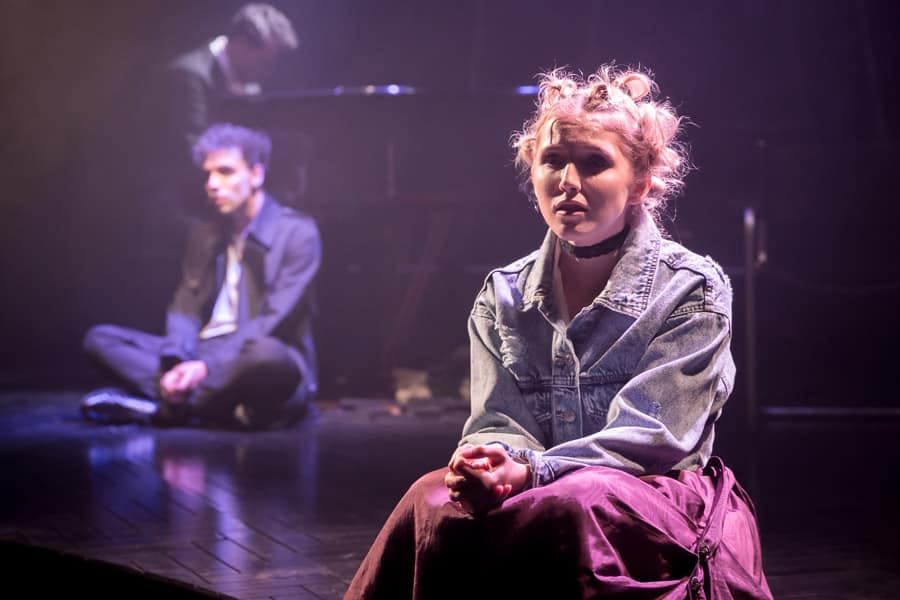
Into the tech, of course, must pour the notes of the grand piano, produced mostly by the concert-platform version of Rachmaninoff here portrayed by a manly and scrubbed looking Tom Noyes. He wears black tie and tails (Brower also does the costumes, mixing – as indeed the modern concert platform does to this very day – the period with the modern). His is a mute role, save for the sounds he can produce with his instrument, which, let it be known, are excellent, but he is also an accomplished actor and every bit as eloquent with his body and stance, which he plays with equal virtuosity (aptly and vividly judged movement by Ste Clough). The ‘other’ Rach, the one who at the start perches, febrile and anxious, on a Russian Empire style salon chair, is the exact opposite of this. Keith Ramsay’s dishevelled black rain-coated artist, with Liza Minnelli eyes and Lilian Gish mouth, is the delicate, fragile anima to his other’s stern, big music animus. Facing the Nikolai Dahl of the equally poised, but, oh, so much more confident and controlled cross-gender casting of Rebecca Caine (sat on a modern imitation of a Bauhaus office chair, and wearing the elegantly informal attire of the modish therapist), what we now enter into is a lengthy dialogue between the composer and his unreachable other half: his art. The entirety of the play – because it really is a ‘play’ above all else – dramatises for us the processes through which these two come into conversation with each other and, eventually, find some way of cohabiting the same universe and moving forwards to each other’s mutual benefit.
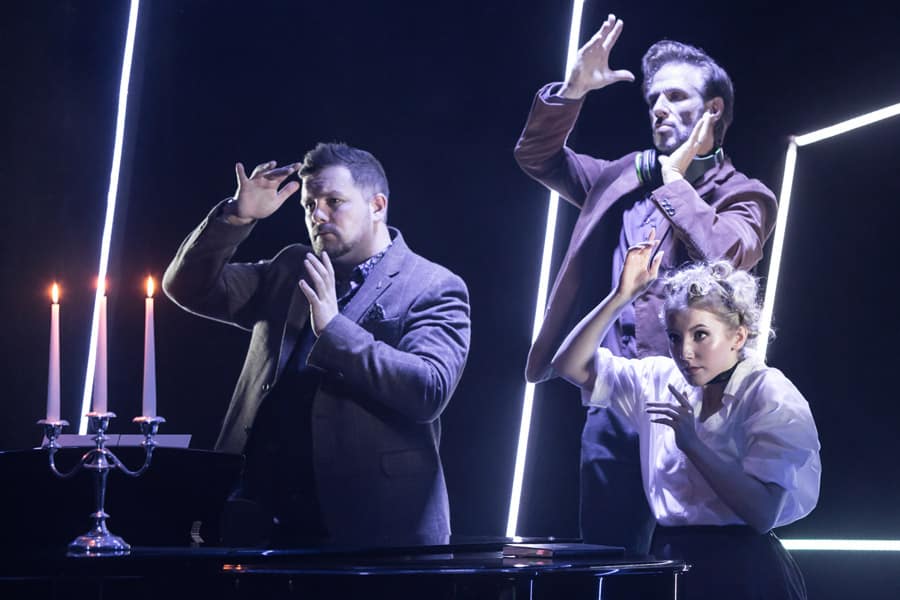
So, I think we have established that this is anything other than a ‘conventional’ musical? Good. What follows over the next couple of hours or so is a mostly through-composed foray into the creative mind and how it can deal with dysfunction. Along the way, one after another, we encounter startling surprises in which our every expectation is neatly and adroitly overthrown. To begin with, there is a prolonged silence. Rach and Dahl stare each other out. Finally, after the emptiness between them becomes almost unbearable, Caine begins her interrogation: and then, we are put in mind not of any other musical, but rather Sarah Kane’s ‘4.48 Psychosis’. You see, Dahl speaks with an American accent, and when he responds, so does Rach. And then we get it: they are in Malloy’s (and our) here and now. This is a play that is every bit as much about him, and us, as it is about them. We aren’t spectating on Rachmaninoff; we are seeing Malloy at work, and – through him – we see ourselves. The audience plunges into a unified and totally unbroken silent contemplation of what it is seeing and hearing. And though the lights may come up on the central aisle, and actors may go up and down it, sitting or standing right next to us, we never feel anything other than completely hypnotised by their theatrical magic. Safe and calm and allowing our thoughts and feelings absolute freedom, we experience exactly the same remarkable journey into the hearts of ourselves, into our very spirit, as the composer of the ‘Symphonic Dances’, or the writer of strange new American musical theatre.
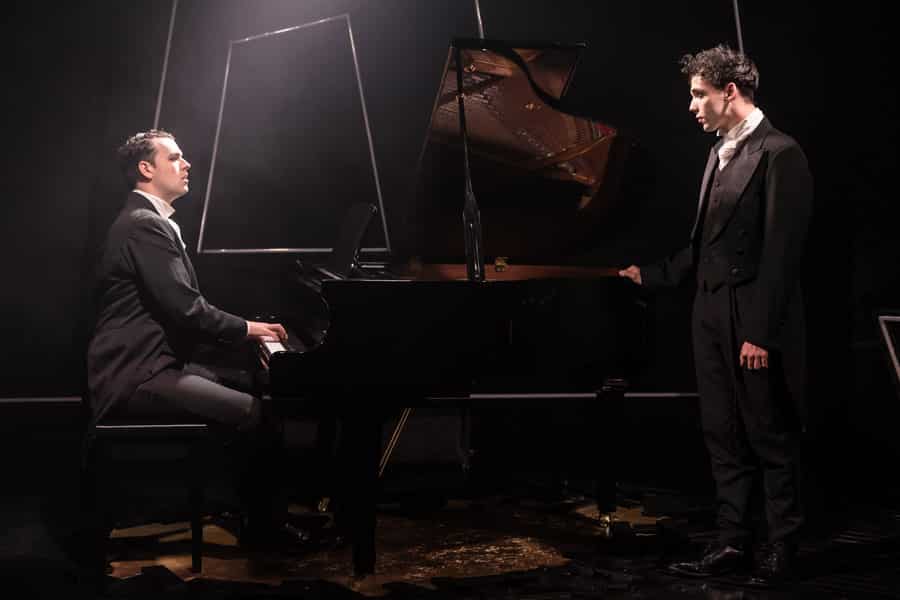
As long as you’re ready to go on that kind of a journey – and the overwhelming majority of audiences appear to be – then this is going to be a remarkable and wonderful experience for you. Nevertheless, some people may find it too much; such introspection can be demanding and, conceivably, too troubling. Then it is not for them. A few people left at the interval. But the rest of us sat transfixed in our seats, upright, alert, interested, engaged, fascinated, leaning ever so slightly forwards and listening intently to this powerful and mysterious drama. Stephen Sondheim has noted that the advent of amplification has led to audiences in musical theatre ceasing to listen: well, this is one show where the extraordinary balance between the magisterial piano and the human voices and electronic sounds around them can only be achieved through brilliantly careful and well-judged use of microphones and sound mixing. In that sense also it is very much of our age, where we meet digitally modulated sound all the time. The audience only produces two utterances: applause at the end of the first act, and then again at the end of the performance. That’s it. Much of the show is actually very funny; but if you laugh at the humour, you never hear yourself doing it – and neither does anybody else, rather like in a dream.
En route, we get to hear a lot more of Rachmaninoff’s oeuvre, passed through the imaginative filters of this team. Georgia Louise (fresh in from playing the lead in ‘Mamma Mia!’, and oozing West End charisma), as Rach’s fiancee, Natalya, sails ethereally through his Vocalese while conducting her piano lessons. A vigorous and rambunctious Norton James (taking time off from the Barricade Boys, et al) is suitably operatic and grand-guignol as Rach’s best mate, Chaliapin, at one point cavorting around the stage in flamboyant red cape, horned mask and full motorcycle leathers, as Gounod’s Mephistopheles doing a ‘Loop’ – one of many in the event – on other musical material to open the second act. There is also the mysterious figure of Steven Serlin’s consummate ‘Master’, who manifests variously as a drunken Anton Chekov on a shoot, aiming a rifle at the audience, or a bad-tempered Leo Tolstoy and even Tsar Nicholas II, who he plays as a sinister New York gangland boss. When this company is together, they give us riffs of extraordinary mesmeric power on – amongst other things – the first symphony and the haunting Vespers. But this show is never going to turn into ‘Song of the Steppes’. Thank God.
Caine’s steely poise as Dahl always seems to be standing guard to keep it on the right intellectual and artistic track: she does not sing nearly as much as the others, but her ‘Hypnosis’ towards the end of Act 2 is worth waiting for: a sublime piece of musical theatre delivered by one of the best in the business (she introduced the role of Cosette in ‘Les Miserables’, amongst others), and a glorious apotheosis to the whole show. Yet, ultimately, this show belongs more than anything to the pair of Noyes and Ramsay, whose tireless performances – one at the keyboard, and the other all over the place – propel us through this extraordinary and unforgettable journey. Ramsay in particular pushes himself almost to breaking point in pursuit of the absolute realisation of Rachmaninoff’s extremity in a compelling exhibition of turbulent and often uncontrollable, incomprehensible emotions and inexpressible thoughts. It is a dangerous and wild incarnation of the mortal darkness into which Rachmaninoff seeks to throw the light of his music.
Finally, at the end, what do you get out of this. Well, I was glad I was already booked to come back and see it all again, because that is all I wanted to do. When something is this superb, you just want more of it! Oh, other good news: Dave Malloy’s ‘Ghost Quartet’ will also receive it’s UK premiere at the new Boulevard Theatre in Soho from 24th October. He has arrived!
